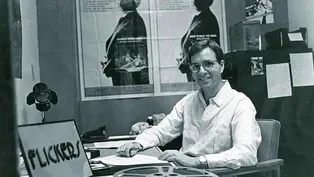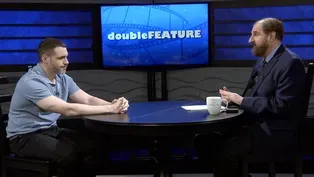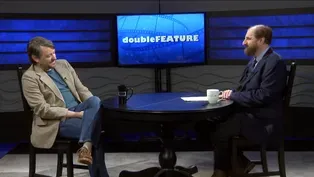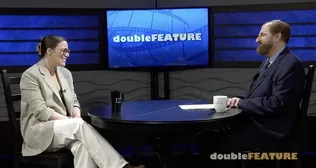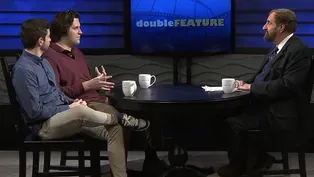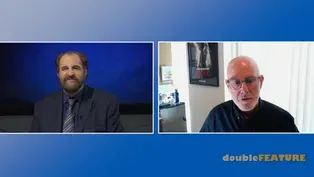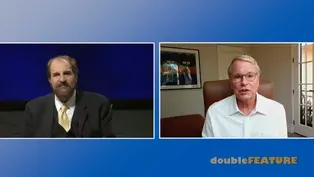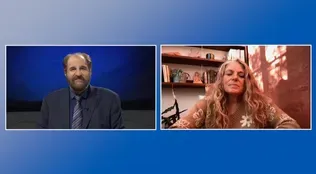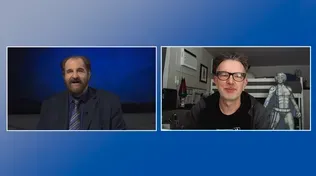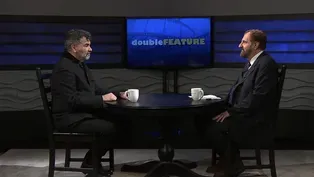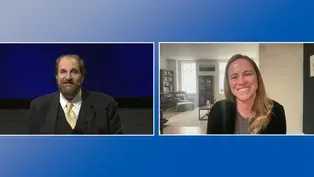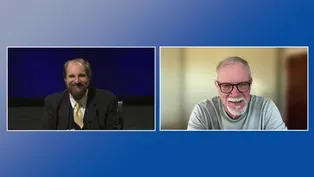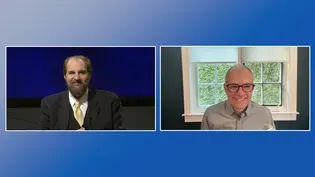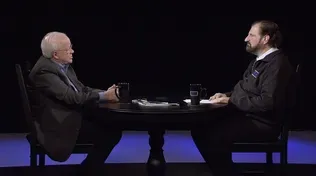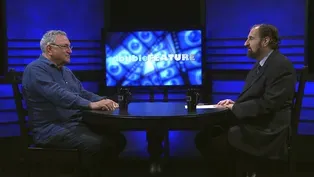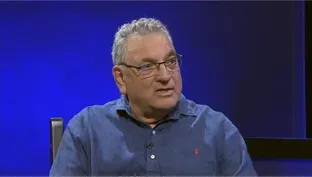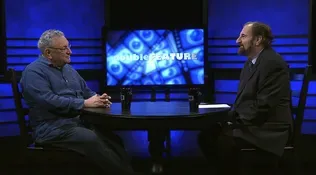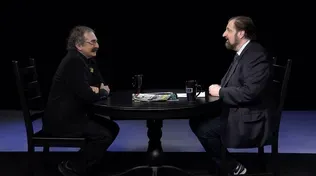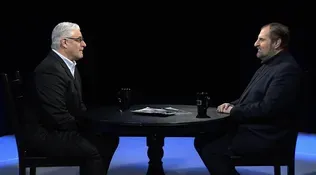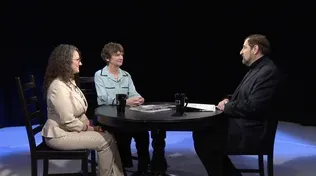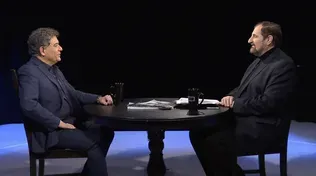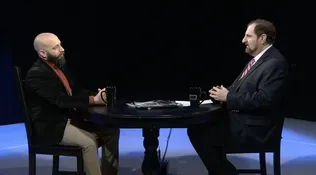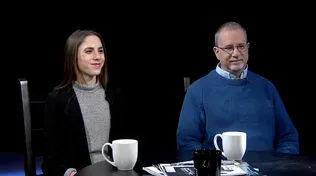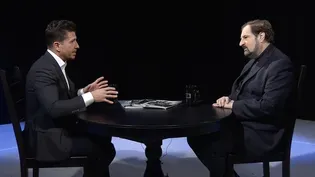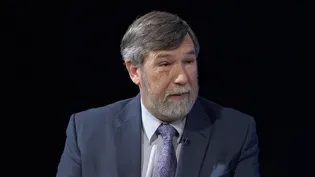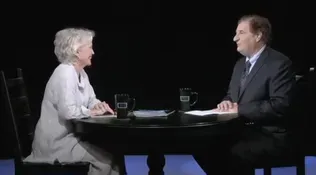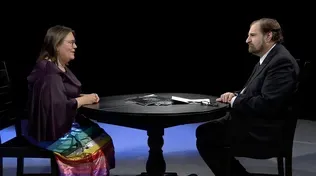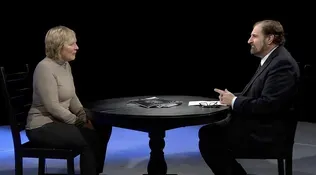
Interview with Erika Hampson
Clip | 40m 24sVideo has Closed Captions
Steven Feinberg interviews producer Erika Hampson.
Steven Feinberg, executive director of the Rhode Island Film and Television Office, interviews producer Erika Hampson, whose work includes such films as "Whitney Houston: I Wanna Dance with Somebody," "The Polka King," and "Ava."
Problems with Closed Captions? Closed Captioning Feedback
Problems with Closed Captions? Closed Captioning Feedback
doubleFEATURE is a local public television program presented by Rhode Island PBS

Interview with Erika Hampson
Clip | 40m 24sVideo has Closed Captions
Steven Feinberg, executive director of the Rhode Island Film and Television Office, interviews producer Erika Hampson, whose work includes such films as "Whitney Houston: I Wanna Dance with Somebody," "The Polka King," and "Ava."
Problems with Closed Captions? Closed Captioning Feedback
How to Watch doubleFEATURE
doubleFEATURE is available to stream on pbs.org and the free PBS App, available on iPhone, Apple TV, Android TV, Android smartphones, Amazon Fire TV, Amazon Fire Tablet, Roku, Samsung Smart TV, and Vizio.
- Hi, I'm Steven Feinberg, executive director of the Rhode Island Film and Television Office.
Our guest tonight is a phenomenal producer.
She's worked on such projects as "Infinitely Polar Bear" with Mark Ruffalo and Zoe Saldana, "The Polka King" with Jack Black, "Discovery" with Robert Redford, Jason Segel, and Rooney Mara.
I wanna welcome Erika Hampson to the table here at "Double Feature."
Hi Erika.
- Hi my friend.
How are you?
- I'm doing great.
Where are you?
In New York right now?
- I'm in my apartment in New York City, yeah.
- Well, now, just so the folks know, Erika is originally from Cumberland, Rhode Island.
We met on "Infinitely Polar Bear."
That was being directed by Maya Forbes and her husband Wally Wolodarsky, and we forged a friendship.
I don't know what year that might have been.
Do you know what year that was?
- Yeah, I mean, I think it was probably 10 years ago.
- Wow.
10 years ago.
And then after that you worked on "The Discovery."
Oh, "Measure of a Man" with Donald Sutherland was another film that you did here.
How did you even get involved in the film industry, Erika?
- You know, I think I was just, I was lucky.
I graduated from Boston College and moved to New York with three of my roommates, and just, you know, happened to be walking past a production one day where a PA had quit.
I needed a job, they needed an assistant.
So got my foot in the door that way.
And then, you know, from there, I learned about this show :Law and Order: Criminal Intent" that was gonna start shooting, so, you know, got a production assistant job on that and, then became Vincent D'Onofrio's personal assistant.
- Wow.
- And, yeah.
And then he decided to write and direct a movie that he was gonna self-finance and shoot at his property in Kingston, New York, and he let me produce it.
And, you know, it's a tiny $100,000 movie that we shot over the course of 12 days.
I was in control of the money.
(Steven laughs) Figured I'd go back to assisting him after that was over, but I think, as tends to happen a lot in this business, you know, I met people on that set who had a movie that they were gonna shoot, you know, in Boston, so then I did that and then, you know, met someone on that set who had a movie in New York, and so I just, I really fell into it by accident and suddenly was a line producer.
- When you went to, is it BU?
Is that where you said you went, BU?
- BC.
- BC.
Were you studying film at that time, or what were you majoring in?
- I was studying, Yeah, I was studying communications.
- Okay.
- I wanted to be a writer, but I think more along the lines of a journalist.
- Yeah.
- Than a filmmaker.
But then, you know, I took a film course junior year where we got to write and film and then edit our own projects, and kind of fell in love with it, and decided to make a shift.
- Oh, wow, and then, you know, this business is so, you know, networking is so prevalent.
And I always thought, when I was growing up, I always thought networking was, ooh, I don't know.
I like to make friends, just to make friends, not with any ulterior motive, but I realized over time, networking is just about making friendships and looking out for each other, and if you're like-minded, if you're positive energy and enthusiastic, a team player, collaborative, responsible, good things happen, right?
You get these other opportunities come your way.
- Yeah, I mean, it's really true.
I think like on every movie set, you know, I meet a lot of friends, you know, three or four people who I'll probably carry with me for life.
And, you know, a lot of those folks I get to work with more than once, you know?
- Right.
- They'll come (audio cuts) to me if they have another project.
So yeah, I agree.
I think, you know, you can network and still make friends.
Like those things can go hand-in-hand.
- Right.
So when you were doing your PA work and doing these different things, did you have a long-range plan for yourself, or were you just trying to figure it out?
- Yeah, I mean, I was just trying to make money and pay rent.
- (laughs) Right.
- You know, I did know that I liked it enough.
I mean, PAing is really hard.
You're at the bottom of the food chain.
You don't make a lot of money.
You work really long hours, and so I think if you can do that job and decide that you like it, it means you are probably meant to be in this business in some capacity, but I certainly didn't know what I wanted to do, so I think my career kind of found me.
- So then when you started, Vincent D'Onofrio, actually the first time I ever saw him was a student film at USC when I was going to USC Film School.
He was in that film, and he was a young actor, just getting started.
When you were charge of the money, how did that come about?
I'm now, I'm the money man.
I'm the money woman.
- Yeah, you know, I think honestly, it's because he trusted me.
You know, I've been working with him at that point for a few years.
It was his own personal money, you know, $100,000 of his own money.
And so I think that was it.
It just, he knew that I would do right by him and keep us on-budget.
And I did, you know, I took it very seriously.
So, I didn't at the time really even understand the difference between like a producer and a line producer.
- Yeah.
- So I just knew that I couldn't go over budget 'cause I didn't wanna lose my job.
- Yep.
What about, did you have any mentors at all as you were getting involved in the industry?
- You know, not when I was a PA, but when I jumped up to produce his movie.
- Yeah.
- You know, I was to sort of, we shot it during the hiatus, the summer months, you know, between seasons for "Criminal Intent."
So this guy, Mike Smith, who was the first AD, and Mary Rae Thewlis, she was the UPM at the time, like, I was able to call them, you know, at any given moment and ask what I now realize are very kind of basic, silly questions, but, you know, they never made me feel stupid and would always kinda give me the answer.
So I would hang up with them and then act like I knew what I was talking about to the crew.
- [Steven] (laughs) Yeah.
- And then when I started jumping up, I mean, one of the first movies that I did, you know, I think it was like $1 million.
It was in Boston.
It was my first union movie.
- Yeah.
- And Robin Wrightman, who's, you know, an amazing accountant and also from Rhode Island.
- Yeah.
- She was a huge mentor for me, 'cause she really kind of taught me how to budget.
You know, I had never used the budgeting software that you're supposed to use for movies.
Like, she really took me under her wing and taught me a lot of what I know today.
- Oh, that's great.
Yeah, Robin, I've known since childhood.
Oh, wow.
- Yeah, oh, no, since, I remember the first time I met Robin, she was hanging upside down on a tree.
I swear to God.
(laughs) (Erika laughs) - Sounds about right.
- So you and I met you were doing a, producing a movie, "Infinitely Polar Bear" with Mark Ruffalo and Zoe Saldana.
It was being directed by Maya Forbes.
It was an autobiographical story.
And her husband, Wally Wolodarsky.
I think they were co-directing, right?
Co-directing that film?
- No, that one, it was just, I think they maybe co-wrote.
She was the only credited director.
- Okay.
- But, you know, I mean, they're a husband wife team.
(Erika's audio cuts) - They're a tandem, yeah.
Now, how did you get involved in that show?
- You know, that was actually a little bit because of Vincent.
Vincent had just done this movie with this company, Paper Street, and then Paper Street paired up with Park Pictures to make this movie, "Infinitely Polar Bear."
And so I think they kind of heard the guys at Paper Street heard my name through him, and you know, they put me up for the job.
At that point, I knew everyone at Park Pictures.
Sam Bisbee.
- Sam, right.
- Was one of the producers on the movie that Vincent wrote and directed.
So, you know, he kind of vouched for me, and I met Maya and Wally, and we all got along, so I got hired for the job, and I think it certainly helped that they were wanting to shoot in Rhode Island and I was from Rhode Island.
- Yeah.
- Even though I was living in New York at the time.
So it all kind of came together.
- And that's a really great film.
And what you guys, that's a story about... And Mark played, what was?
He was bipolar.
- Yeah, bipolar.
And just in short, it shows really kind of what that can do to a family, you know, it was done in a very kind of good, sensitive, loving way, so I know that was- - So and then Zoe's character was dealing with racial issues and trying to get a job, and I just thought they did such a wonderful job together.
And it was, like you said, it was handled very delicately and nicely, and I really, one of the things that I noticed, having worked with you and working on 20 productions just here, 20 years of productions here in Rhode Island, what I found is that your crew loves working for you or with you, and you create a nice atmosphere and dynamic.
But everyone I ever talk to, "I love working with Erika.
I love working with Erika."
That's gotta be a nice feeling.
- Yeah, it's a very nice feeling.
You know, it's certainly better than hearing that people hate me.
- (laughs) They hate me.
They hate us.
- (laughs) I'm sure, some.
- No, I've heard that, too, on other projects.
I've heard that on other projects.
I'm sure you're, you know, like, sometimes the crew will not like a producer, and sometimes that can happen.
You've worked with Maya and Wally on several films, right?
- [Erika] Yeah, we followed "Infinitely Polar Bear" up with this movie, "The Polka King," which we also shot in Rhode Island with Jack Black.
- With Jack Black, yep.
- Yeah, which was a lot of fun.
We based out of Pawtucket mostly.
- Yeah.
Yep.
- And then they brought me on board this other movie that, it was called "The Good House" with Sigourney Weaver, and we shot it up in Nova Scotia.
That was- - And Kevin Klein, too, wasn't he in it as well?
- Yep, Kevin Klein.
We did it, I think we like in the fall before the pandemic.
So (drowned out by Steven) - Yeah, I know we were trying to bring that movie to Rhode Island, but I didn't have enough tax incentives at the time.
- Yeah.
Yeah.
- But yeah.
- And we tried to keep it in Massachusetts.
They really kind of wanted to keep it in New England, I think at, you know, at that point they had fallen in love with the crew in New England and really wanted to bring work back, but it just financially, you know, 'cause of the dollar exchange in Canada, it just, it kind of didn't work out.
The studio sort of said, you know, you have to go up north.
So we did.
- Do you guys have another film lined up with them?
Anything upcoming?
- No, not that I know of.
I mean, I, you know, I think they kind of make a movie once every, you know, three to five years, and so I certainly hope so.
We're coming up on actually that time period.
I should reach out.
But, you know, I would love to work with them again.
- We would love to have you come back to Rhode Island to work with them as well.
Wally's a character.
They're such nice people.
- Yep.
- And they have a nice demeanor about 'em.
Then you also did one of the films, "The Discovery" with Rooney Mara and Robert Redford and Jason Segel, who, you know, how was that experience?
Can you talk about that a little bit?
- That experience was probably one of the best that I've ever had in my career, and I think the crew would agree as well.
It was just one of those really special movies, where everyone just kind of came together, had fun, worked really hard, but we really just kind of felt like a film family, you know?
And we were shooting in Newport in the off season, so I was living in, you know, in Newport.
I'm never gonna complain if I'm being put up by the beach.
- (laughs) Right.
- And, you know, it was like mostly one location, so it was very contained and easy from a production standpoint.
It's just, I remember at the wrap party, everyone, and even, you know, a couple years later when I went back to do another movie, like people would always just say like, "Man, that was such a great experience."
And I don't know, it really was.
Like, the cast and the crew hung out together.
You know, it was, I feel very lucky to have to have had that experience, 'cause, you know, making movies, it's hard, so it's especially rewarding when you can have fun.
- And that became a Netflix movie, and it, Charlie McDowell was the director of that.
And he's the son of Mary Steenburgen and Malcolm McDowell.
- Yeah, and the stepson of Ted Danson, so that was also fun.
'Cause Mary was in the movie, so then like, Ted was around for part of it with her.
So, you know, Charlie had his family with him, and so yeah, it was great.
- Yeah.
I remember we had a great screening at the Jane Pickens Theater.
And then you recently did the Whitney Houston film, "I Wanna Dance With Somebody."
How was that?
That was, I thought you did a phenomenal job on that film.
It was big.
- It was.
It was very big.
It was by far the biggest movie that I've ever produced.
you know, so it was big in terms of money, but big in terms of scope as well.
- Yes.
- You know, a lot of background actors recreating all of her concert scenes, you know, visual effects.
I mean, for me, it was great, 'cause I learned a lot on that film, and it was a challenging movie, but yeah, you know, I'm proud of it.
- I think you should be.
I remember seeing it, and I think I either called you or texted you right away.
It was really beautifully done.
And I was just in awe, especially at the recreations that you had to do.
And were you having to deal with a lot of research on that?
Were you guys having to do a lot of research or how were you gonna make things happen?
And it was all filmed in Boston, right?
- It was filmed in Boston.
We had a stage in Quincy, Marina Studios, which was, you know, fantastic to have use of that space.
And yeah, I mean, we, there was a lot of research.
I mean, I think a lot of people on the movie were at an age where they grew up, you know, listening to her music.
- Sure.
- So a lot of the crew was already very familiar with her, and the other thing is that we had Clive Davis and the Houston family on board as producers, so we were able to tap into a lot of, you know, her backstory and ask questions of them, which definitely helped.
But I know, like Jerry Sullivan, our production designer, he did a ton of research to be able to accurately recreate, you know, a lot of the sets and the concert pieces.
So he had a very big job on his hands, and he knocked it out of the park.
- It was just incredible.
When you're dealing, a lot of times, Erika, you're dealing on an independent film level, right?
As far as not all your productions are studio productions.
How do you get involved as a producer?
Are you finding scripts?
Are you developing projects yourself?
Are you a gun for hire?
Like, how do you typically get involved in a production, and are there projects you're developing?
- For the most part, I'm a gun for hire.
- Okay.
- You know, I'm brought in by a studio or an independent producer once they have a script that's, you know, pretty solid.
Sometimes there's already cast attached.
There's always money attached, and then I just kind of come in and do my thing.
You know, there are a couple movies that I've helped, not so much develop, but like been with from the very beginning.
And I did this movie, "Passing," which Rebecca Hall wrote and directed and acted in, and that's a movie that I had been attached to, you know, for years.
I met her in Massachusetts on this movie, "Tumble Down," and she was talking about that movie back then, and then, you know, me, Rebecca, and Margot Hand, who's a producer, really kind of fought to bring it to life.
But, you know, that's probably one of the only examples I could cite.
I'm not really a, you know, developing producer type.
- Yep.
And so when you get a script, tell me, what's the process?
You get a script.
Do you get a lot of scripts that are, do people say, (gasps) "Oh, you're a Hollywood producer.
Oh, I love..." Do you get a lot of people submitting scripts or trying to get scripts to you?
- Yeah, I mean, there's a lot of people who are, like, trying to get into the industry, and so they'll reach out and ask if I'll read and give advice or if I can kind of point them in the right direction.
And then I also do get a lot of scripts, you know, from studios.
- Yep.
- That want either a budget for a movie to know how much it would cost if they wanted to greenlight it, or just, you know, scripts that turn into offers for jobs.
I mean, certainly not so much lately, because of, you know, the strike.
- Right.
- But yeah, normally in a year where two unions weren't on strike, I get probably, you know, four or five scripts a week.
- And just so you folks know, we probably wouldn't have her on the show, because she wouldn't be available.
She's usually working all the time.
The strike's actually been to our advantage.
Thank you very much.
(laughs) (Erika laughs) So when you're doing a budget, so some films, let's say it was a drama, but you don't know who's your cast.
Does the cast sometimes drive what the budget can be?
Like, how do you deal with that?
- Yeah, I think, you know, if there's not cast attached, you sort of make assumptions based on the overall budget that the studio or the financier is wanting you to hit.
You know, so if it's a smaller movie, you're just not really gonna be able to pay your actors a ton of money, regardless of who they are.
So yeah, and then certainly when actors start getting attached to scripts, if they're very valuable, then oftentimes the studio will say like, okay, you know, we can raise things by a million dollars, or, you know, whatever the number is.
- Right.
- 'Cause it's all, you know, it's a money game.
- Yeah.
- So, you know, depending on how much money they think they're gonna make back, which oftentimes is due to the cast that's attached, like that determines sort of what I'm trying to back into.
- I was just talking to a friend of mine who's a studio executive.
He's a vice president of production, and he said, "You know, typically we try to get two pages a day."
I said, "Oh, I think in the independent world, it's a little different."
How many pages a day are you trying to get in, typically, on an average?
- On an indie film?
- Yeah.
- I mean, it could be anywhere from four to eight.
I mean, eight is super aggressive.
I would put it more at like four to six.
- [Steven] Yep.
(Erika's audio distorts) - 'Cause that's the thing, if you don't have a lot of money, then you don't get a lot of days.
- Yeah.
- You know, a lot of shooting days, and so you're really trying to pack everything in, so yeah.
- When you're doing a film on an independent film, are you encouraging using one camera or two cameras?
- I always budget for two.
You know, I think the day can go a lot faster with two cameras.
- Yep.
- But then, you know, at that point, I sort of leave it up to the director and the first AD and the DP.
Like once they start shot-listing and figure out how they're gonna cover the scenes.
- Yep.
- Like, they let me know if they wanna utilize the B camera every day or not.
- Do you find that most of the filmmakers are using one or two cameras, typically?
- I mean, the movies that I do, two is the minimum.
I mean, on the Whitney Houston movie, which is, you know, an exception to the rule, I think we had always three cameras going, and there were times that we had, you know- - Five?
- Or five, yeah, for the concert scenes.
- Yeah.
- But yeah, I think two cameras is pretty typical these days.
- Yeah.
Are you involved at all in the casting process?
Do you get involved in that aspect?
- I mean, not really in a creative manner.
It's more like- - Budget?
- You know, if my budget, yeah.
If my budget assumes that we're gonna hire, you know, that we can only bring in three actors from New York if we're shooting in Rhode Island.
Like, everything sort of has to be run by me if they wanna go outside of that.
- Yeah.
- And then once we decide who we're casting, I'm certainly involved in, you know, helping to make their deals.
- Yeah.
- But I'm not sort of choosing the actors that we're gonna put in front of the directors.
- Right.
And for an audience, because when you're doing the hiring of an actor who might be from New York and they're coming to Rhode Island, you have to pay them their hotel, a vehicle probably, per diem, right?
Per week.
(Erika's audio distorts) You're giving them X amount of dollars.
And what other expenditures do you have?
- I mean, that's- - Those are the ones, right?
- That's pretty much it, yeah.
- Yeah.
- So are there particular parts of the process that you really do enjoy on a production?
Is it pre-production, the production itself, post-production, trying to get money?
(laughs) - Yeah, no.
(laughs) You know, it's all hard.
I mean, the most enjoyable moment I think is, you know, when you see the movie at the premiere or on TV and you're proud of it, and you can sort of justify having spent, you know, four or five months of your life making the movie.
But yeah, it's just, I mean, you know, I don't know.
It's not necessarily that I enjoy it, but, like, the prep period is where I devote a lot of my attention.
I mean, I think it's, you know, probably the most important part of filmmaking.
If you prep a movie correctly, then the shoot is gonna go, you know, a lot better for all involved.
But yeah, it's just, it's hard work.
- Now, do you have any particular projects that you love to do?
Like, do you prefer romantic comedy?
Do you prefer a drama?
Suspense?
Are there certain projects that you love more than others, as far as genre?
Or are there certain genres that you're looking forward to doing that you haven't done?
- No, I mean, I'm not a romcom person.
Like I don't love predictable, formulaic films.
- Yep.
- I just like good content, you know.
- Mm-hmm.
- And these days, you know, the script is obviously very important to me, but it's also the people who are involved and where it's gonna be shooting.
Like, those are kind of the three things that factor into the projects that I choose to spend my time working on.
But like, my taste in movies is, I like kind of weird, non-linear, like "Memento" and, you know, "Go," "Donny Darko," like stranger kind of films.
- Yeah.
Have you had any opportunities to film in any exotic places?
- Yeah, I mean, you know, not so much exotic.
I've shot in Canada a bunch.
Spain, Colombia.
- Oh.
- I did a cruise ship movie where we were on a ship for two weeks and we would get off at every sort of port and film, so that was like Haiti, Jamaica.
- Wow.
- You know, a lot of the Caribbean islands, so I guess that's a little exotic.
- What kind of crew would you get?
Would you bring in crew on a production like that?
- Yeah, so it was a weird movie.
We started in New York and we did five weeks here, and then we went to Florida and did two days there, and then we hopped on the ship.
And so we, like with New York, that was our local crew.
And then we took the department heads with us to Florida and then crewed up locally, and then the ship, because it was an actual, like, operating ship with like 6,000 people who were paying to be on vacation, so we had to be very aware of that.
- Wow.
- We had a really tiny crew.
I mean, I think, I think they gave us like 25 rooms, and that included the cast.
So it was bare bones, but it was people that we brought from New York, and some of them from Florida actually came with us.
- Wow.
What was the name of that film?
- It was called "Like Father," and it's with Kristen Bell and Seth Rogen and Kelsey Grammar, and Seth's wife Lauren directed it and wrote it.
- Oh wow.
And were, were there a lot of looky-loos on... You're on a ship, right?
(laughs) - Yeah, well, we got lucky.
I mean, lucky's not really the right word, but we got hit by Hurricane Irma.
- Okay.
- We had to actually evacuate, and then got onto the ship a couple days late.
And because of that, a lot of people canceled their vacation for that first week.
- Oh.
- So the first week, we had our run of the ship.
- Oh, that's great.
- The second week, everybody came on, and yes, I mean, we had to have security with us, and, you know, there were definitely a lot of looky-loos.
But I mean, you know, kind of no matter where you shoot a movie, you're always gonna have that.
- And would you use their dining facilities and all that stuff?
So you knew that you had a nice commissary, so to speak?
- Yeah, it was sort of, we paid like one price to Royal Caribbean and that included our, you know, our rooms on the ship, and it was breakfast, lunch, and dinner.
And then we shot all over the ship, you know, in a way it's a little bit of a commercial for Royal Caribbean.
- Yeah.
And now I wanna go on a ship.
I'm ready to go.
(laughs) (Erika laughs) - There we go.
(laughs) - That's funny.
What are you working on now?
Anything in particular that you've got going on right now?
- Right now, no, not much.
- Because I know the strike, or was there anything that you were working on when the strike hit?
- I mean, I was attached to this movie.
It was gonna be a sequel to "Dirty Dancing" with Jennifer Grey that was gonna shoot in Atlanta, and, you know, it needed a rewrite before we could officially go into prep, and it was like, just as everyone was talking about the fact that the writers were most likely gonna strike.
- Mm.
- So the studio hit the pause button.
So, I mean, I'm lucky in that I'm still getting asked to do a lot of budgets for studios, 'cause I think they're wanting to line up content for when everything is resolved with SAG.
- Yep.
But no, I mean, I have a movie that's coming out in a couple weeks called "Quiz Lady."
Disney.
- Tell us about it.
- It's Sandra Oh and Akwafina, Will Ferrell are in it.
It's a comedy.
The two ladies play sisters that kind of go on a road trip and Akwafina ends up on a Jeopardy-like TV show that Will Ferrell is the host of.
- (laughs) Sounds kind fun.
- Kind of the like the Alex Trebek character.
So it's, you know, it's good.
We shot it in New Orleans.
- Oh wow.
- Maybe like a year and a half ago.
- Wow.
Now, what's it like filming, or how is it different?
Do you film, you have filmed in New York City, you filmed in, you just mentioned New Orleans, you filmed in Rhode Island, Vancouver.
Are there differences when you're doing a production in a different location?
Or are you just in a cocoon?
The production is the production?
Like, do you feel the differences of the areas that you're making your movies in?
- Yeah, I mean, there's always sort of a different vibe, you know, to every location that I'm shooting at, and there are differences.
I don't necessarily know in the way that a crew would feel, but like, for me, in the way that I have to budget, like each area has different rules, you know, different rates.
They kind of do things in their own way.
- Yeah.
- So, you know, if it's a place that I'm going into that I've never worked at before, I usually have to do a little bit of homework to get up to speed and kind of know what the lay of the land is there.
- Yeah.
Do you have any particular preferences of where you prefer to film?
- I mean, I love shooting in Rhode Island and Massachusetts.
My family, you know, still lives in Cumberland, and I have a place in Narragansett, so it's always nice, you know, to feel like I'm working at home.
And then I like working in the city, New York City as well, for the same reason.
It's nice to sleep in my own bed at night.
But, you know, outside of those places, I really love Vancouver a lot and I love New Orleans.
Those are two of probably my favorite places to (audio cuts) - Have you filmed in Atlanta?
- I haven't.
The closest I got to it was scouting for that "Dirty Dancing" movie.
- Oh.
- But you know, no.
I've never had the opportunity.
- Yeah, what about, do you have any interest in directing at all?
Or do you want to stay in the producing area?
- I think, you know, I've accepted at this point in my career that my strong suit is what I'm doing.
You know, exec producing, line producing.
My brain just doesn't really work in a way where I think I would be good as a director.
So (audio distorts) - How so?
What do you mean?
- I just think that like, I don't know.
When it comes to like solving, you know, like a story issue or you know, a on the day, being able to, I think maneuver, like, you know, if a certain story beat is not working, to come up with a different way to do it and, you know, and also just in terms of like the way you have to be able to talk to the actors to get a performance out of them.
It's like, that's just sort of not, I like watching people do it well, you know, but like, I don't know that I would have that skillset.
So what I'm happy where I'm at.
- What's your favorite part of producing?
- I think it's just the day-to-day solving of problems, and feeling, you know, like a useful part of the machine.
So it's always nice to help the director sort of bring his or her vision to life and, you know, I like being one of the people that gets to be in the room doing that.
- Yeah.
Do you typically encourage, or not, a director to have rehearsals?
Is it sometimes not even a feasible idea because of your budget constraints?
What do you find?
Is it something that's great?
Not great?
- I find it to be helpful if the director and the cast can get together, just to sort of get like the first-day jitters out of the way.
- Yeah.
- You know, before we're going to camera.
You know, it helps for them to sort of find their character, I think, and you know, like, so a lot of times they wanna block ahead of time so that we're not wasting time on the day.
So if the director is someone who likes to rehearse, I always find room in the budget to make that happen.
- Yeah.
- I've worked with some directors who have just zero interest in it.
You know, they would rather be raw and figure it out on the day.
- Yeah.
- And then a lot of times it does come down to just actor availability.
You know, a lot of actors are super busy and just can't come, you know, a week early to give that time to the production, so that oftentimes dictates kind of what we are and are not able to do.
- Are you the one who, would it be your position or the director's position, let's say an actor came in, and they came in that night and they got fit for wardrobe and their hair, whatever, and then they're supposed to start, you know, the next day or the next night, let's say they came in on a Saturday and they're supposed to start on Monday.
Would you then like encourage the director to take them out to dinner?
Would you go out with them?
Like, what would be something that you would think of doing as the producer?
- Yeah, I think, it would certainly be, I would encourage the director, you know, to take them out for dinner or a drink just to sort of get a feel for each other.
- Yeah.
- Especially if they've never worked together or met before.
I normally do end up having dinner with the cast, but not right out of the gate.
You know, we kind of let everybody settle in, and then we usually do like a producer/director/cast dinner once everyone's a bit more comfortable with each other.
- Yeah.
- So, yeah.
And I, you know, I think if an actor's flying in on a Saturday night, you know, I am paying for a bunch of the crew to be working on a Sunday, 'cause you do wanna make sure that they've had their fitting and that hair and makeup has looked at them before they're going to camera on Monday.
- Yep.
And do you work with particular... Like, tell me about the distribution process.
You've done this film.
does it always have a distributor when you start?
Or is it the, are you finding a distributor after?
And we're talking about whether it's theatrical or streaming or, you know, different territories, international, domestic?
Can you talk about that a little bit?
- Yeah, I mean, I think that's where you really see the difference between independent films and studio films.
You know, like the movie that I did in New Orleans, we knew right from the start that it was gonna be theatrical.
We knew that Disney was gonna put it out.
Same thing with the Whitney Houston movie.
We knew that Sony was putting it out.
Indie movies oftentimes don't have that luxury.
You know, you're making a movie with the hope that you're gonna get into a film festival, that it's gonna get attention, that someone's gonna wanna buy it and then, you know, and then put it out on their platform.
So it's a much bigger risk, I think, to make an indie movie, 'cause there's no guarantee that the world's gonna get to see it.
- Do you get involved at all in the distribution process?
Do you try to help out earlier on and try to find distribution?
Or is that not your thing?
- Yeah, that's not really my wheelhouse.
You know, I'm certainly still involved with the group that's trying to find the distribution, so I'm always in the know about what's happening.
But, you know, my job is pretty much like once the movie, once principle of photography has wrapped, you know, I'm always around to answer questions, but I then sort of hand it off to post-production, and then, you know, the next time I see everybody is usually at the premier.
- Okay, so you're not even, you're not following through even with post-production?
That's like a post-production supervisor?
- Correct, yeah.
I mean, you know, I made this one movie actually in Baton Rouge maybe six months ago, and I wasn't a line producer on that.
I was a producer.
And so I'm following that through.
Like, we're about to finish the director's cut and then we're gonna be submitting to festivals.
So that's kind of, for me, the rare exception to the rule.
But most times on turning things over to the post-sup.
- Now, who's handling the distribution to a festival?
So let's say it goes to post and everything's done.
Then what would happen?
- Yeah, that's when- - Who's organizing trying to get 'em into festivals?
- It's the creative producers, or oftentimes the financier of the indie movie.
You know, they're the ones who are kind of making the phone calls, they're trying to find a sales agent, like they're doing all the legwork to try to get the movie into the festival.
- Yeah, like when we went to Sundance for "Infinitely Polar Bear."
So was that Maya and Wally's doing, or was that, they had, JJ Abrams was also an executive producer on that.
Do you think that was his doing?
- No, I mean, having his name attached to that movie certainly, you know, didn't hurt anything, but it was really, it was Sam Bisbee and Thea Dunlap, who are part of Park Pictures.
- Yeah.
- And then the guys at Paper Street, they also, you know, those two companies combined were doing all the work to get it in.
- It's interesting, really, because a lot of people will watch a film and they'll see four different producers or three different producers and different companies, and what does this one do?
What does this one do?
You're mostly dealing with the actual filming, right?
You're getting that film done.
And so it's the quality everybody was hoping for.
And then there's another producer that's handling post-production maybe, and another one handling distribution, maybe it was another producer that was developing it.
That's kind of what we're talking about, right?
- Yeah.
I mean, there's a lot of cooks in the kitchen.
- [Steven] Yeah.
- There's, you know, many phases to making a movie, so yeah, I mean, you're right.
A lot of people are involved.
- Yep.
Is there anything you would wanna share, Erika?
You know, you've had so many great experiences with so many really talented people.
Anything you would want share with maybe an audience member who's very interested in being in the film and TV industry?
- I would say just work really hard, you know?
I think if you're a hard worker, somebody is gonna notice it and notice the potential in you, and if you can get your foot in the door, you know, that's really all you need.
You can work your way up the ladder.
I mean, that's the thing that I really do like about this business is that, you know, there is a lot of room for growth for people who wanna climb, you know, climb higher, so.
- And be very enthusiastic, and responsible, a team player, collaborate, happy.
I mean, filmmaking, sometimes the hours are very long and challenging, but you want to be in a foxhole with someone who's pleasant to be around and you can count on, right?
- Yeah, I think like kindness is so very important, you know, in this business.
So you know, just be kind, surround yourself with kind people who have, you know, a calm vibe.
- Yeah, well you have- - 'Cause yeah, that was a lot.
- You have the calmest vibe.
And as I said, people, "I love Erika, I love working for and with Erika."
And when I would hear that, that was like, okay, because I love working with you, too.
And to hear that from others, you represent yourself so well, your family.
I know when your mom, dad would go down to the set, and they were so proud of you and they're such nice people.
And I just wanna thank you so much for being an outstanding friend, a super talented producer, and really representing the best of our community.
And you always leave a location in the same condition or better than when you found it.
There's no bad vibes when Erika Hampson is on location.
It's all good stuff.
So I wanna thank you so much for all your work.
I look forward to the future work that you're going to do.
And thank you so much for being on "Double Feature" tonight.
- Thanks Steve.
I admire everything you're doing and I adore you, so thanks for having me.
I really appreciate it.
- Thank you so much.
We'll talk to you soon.
- Sounds good.
- Yep.
The Legacy of George T. Marshall
Video has Closed Captions
Clip | 44m 58s | Remembering the founder of Flickers, George T. Marshall. (44m 58s)
Video has Closed Captions
Clip | 44m 59s | Steven Feinberg interviews director, writer, and actor, Tom DeNucci. (44m 59s)
Video has Closed Captions
Clip | 45m 2s | Interview with Alex Berard. (45m 2s)
Video has Closed Captions
Clip | 44m 59s | Steven Feinberg interviews First AD, Emma Barber. (44m 59s)
Interview with Chad Verdi Jr. and Paul Luba
Video has Closed Captions
Clip | 45m 31s | DoubleFeature shows films from around the world and takes viewers behind the scenes. (45m 31s)
Video has Closed Captions
Clip | 41m 15s | DoubleFeature shows films from around the world and takes viewers behind the scenes. (41m 15s)
Interview with Angela Peri and Lisa Lobel
Video has Closed Captions
Clip | 45m 25s | Interview with Angela Peri and Lisa Lobel (45m 25s)
Video has Closed Captions
Clip | 45m 45s | Interview with Jerry Ketchem. (45m 45s)
Video has Closed Captions
Clip | 49m 15s | Steven Feinberg interviews award-winning filmmaker, Elyse Katz. (49m 15s)
Video has Closed Captions
Clip | 44m 30s | Steven Feinberg interviews storyboard artist, Martin L. Mercer. (44m 30s)
Video has Closed Captions
Clip | 45m 19s | Steven Feinberg interviews Providence Pictures' Gary Glassman. (45m 19s)
Video has Closed Captions
Clip | 40m 24s | Steven Feinberg interviews producer Erika Hampson. (40m 24s)
Video has Closed Captions
Clip | 41m 56s | Steven Feinberg interviews directer/producer Joe Johnston. (41m 56s)
Video has Closed Captions
Clip | 45m 29s | Steven Feinberg interviews producer David Crockett. (45m 29s)
Video has Closed Captions
Clip | 42m 44s | Steven Feinberg sits down to interview the late film director, Douglas Trumbull. (42m 44s)
Henry Bronchtein Interview Pt. 3
Video has Closed Captions
Clip | 15m 25s | Steven Feinberg interviews director, producer, and production manager Henry Bronchtein. (15m 25s)
Henry Bronchtein Interview Pt. 2
Video has Closed Captions
Clip | 14m 51s | Steven Feinberg interviews director, producer, and production manager Henry Bronchtein. (14m 51s)
Henry Bronchtein Interview Pt. 1
Video has Closed Captions
Clip | 15m 33s | Steven Feinberg interviews director, producer, and production manager Henry Bronchtein. (15m 33s)
Video has Closed Captions
Clip | 37m 9s | Steven Feinberg sits down to interview producer and writer, Roger Lyons. (37m 9s)
Video has Closed Captions
Clip | 27m 31s | Steven Feinberg sits down to interview filmmaker Dante Bellini. (27m 31s)
Katie Reaves and Jennifer Jolicoeur Interview
Video has Closed Captions
Clip | 27m 7s | Interview with filmmaker Katie Reaves & Athena’s Home Novelties Pres. Jennifer Jolicoeur. (27m 7s)
Dr. Thomas Zorabedian Interview
Video has Closed Captions
Clip | 27m 6s | Steven Feinberg interviews professor and video producer/writer, Dr. Thomas Zorabedian. (27m 6s)
Video has Closed Captions
Clip | 26m 47s | Steven Feinberg sits down to interview picture editor Rob Schulbaum. (26m 47s)
Ron Bachman and Devin Karambelas Interview
Video has Closed Captions
Clip | 26m 45s | Steven Feinberg interviews Ron Bachman and Devin Karambelas from WGBH in Boston. (26m 45s)
Video has Closed Captions
Clip | 26m 15s | Steven Feinberg sits down to interview filmmaker Eric Latek. (26m 15s)
Video has Closed Captions
Clip | 26m 51s | Steven Feinberg sits down to interview host of Conducting Conversations, Mike Maino. (26m 51s)
Video has Closed Captions
Clip | 6m 34s | Steven Feinberg sits down to interview actress, producer, and screenwriter Marlyn Mason. (6m 34s)
Melissa Tantaquidgeon Zobel Interview
Video has Closed Captions
Clip | 16m 5s | Steven Feinberg sits down to interview author Melissa Tantaquidgeon Zobel. (16m 5s)
Video has Closed Captions
Clip | 26m 51s | Steven Feinberg sits down to interview director Alexia Kosmidor. (26m 51s)
Providing Support for PBS.org
Learn Moreabout PBS online sponsorshipSupport for PBS provided by:
doubleFEATURE is a local public television program presented by Rhode Island PBS
